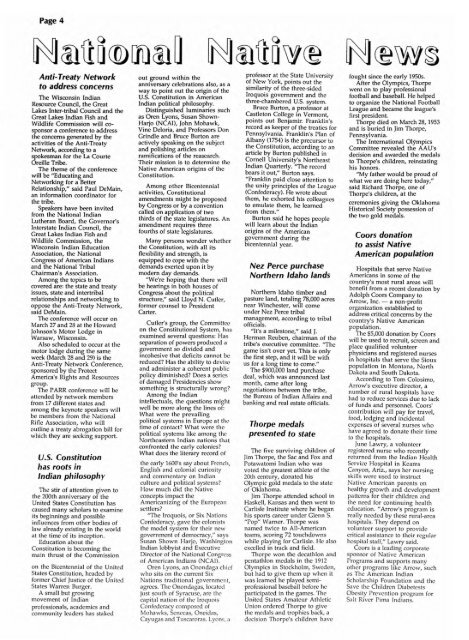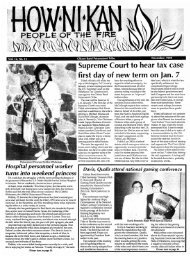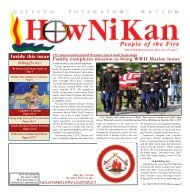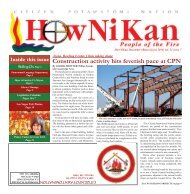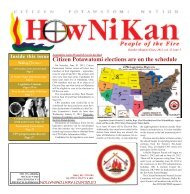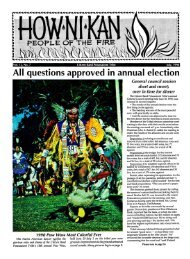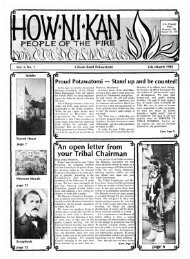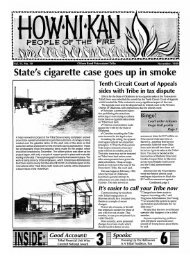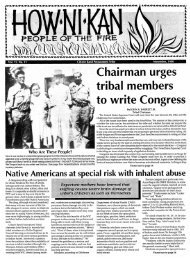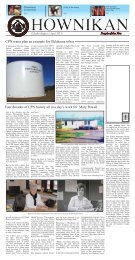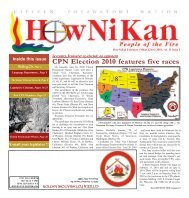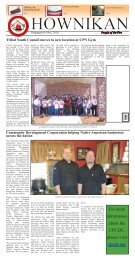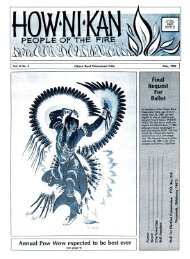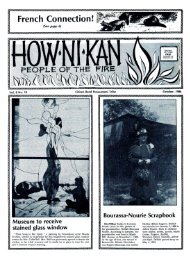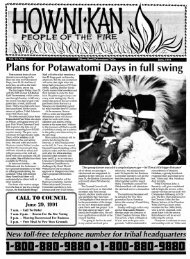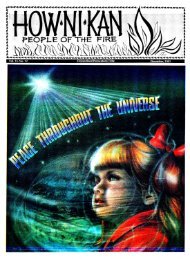Tax Commission declares war - Citizen Potawatomi Nation
Tax Commission declares war - Citizen Potawatomi Nation
Tax Commission declares war - Citizen Potawatomi Nation
Create successful ePaper yourself
Turn your PDF publications into a flip-book with our unique Google optimized e-Paper software.
Page 4<br />
Anti-Treaty Network<br />
to address concerns<br />
The Wisconsin Indian<br />
Resource Council, the Great<br />
Lakes Inter-tribal Council and the<br />
Great Lakes Indian Fish and<br />
Wildlife <strong>Commission</strong> will cosponsor<br />
a conference to address<br />
the concerns generated by the<br />
activities of the Anti-Treaty<br />
Network, according to a<br />
spokesman for the La Courte<br />
CreiIle Tribe.<br />
The theme of the conference<br />
will be "Educating and<br />
Networking for a Better<br />
Relationship," said Paul DeMain,<br />
an information coordinator for<br />
the tribe.<br />
Speakers have been invited<br />
from the <strong>Nation</strong>al Indian<br />
Lutheran Board, the Governor's<br />
Interstate Indian Council, the<br />
Great Lakes Indian Fish and<br />
Wildlife. <strong>Commission</strong>, the<br />
Wisconsin Indian Education<br />
Association, the <strong>Nation</strong>al<br />
Congress of American Indians<br />
and the <strong>Nation</strong>al Tribal<br />
Chairman's Association.<br />
Among the topics to be<br />
covered are: the state and treaty<br />
issues, state and intertribal<br />
relationships and networking to<br />
oppose the Anti-Treaty Network,<br />
said DeMain.<br />
The conference will occur on<br />
March 27 and 28 at the Ho<strong>war</strong>d<br />
Johnson's Motor Lodge in<br />
Warsaw, Wisconsin.<br />
Also scheduled to occur at the<br />
motor lodge during the same<br />
week (March 28 and 29) is the<br />
Anti-Treaty Network Conference,<br />
sponsored by the Protect<br />
America's Rights and Resources<br />
group.<br />
The PARR conference will be<br />
attended by network members<br />
from 17 different states and<br />
among the keynote speakers will<br />
be members from the <strong>Nation</strong>al<br />
Rifle Association, who will<br />
outline a treaty abrogation bill for<br />
which they are seeking support.<br />
U.S. Constitution<br />
has roots in<br />
Indian philosophy<br />
The stir of attention given to<br />
the 200th anniversary of the<br />
United States Constitution has<br />
caused many scholars to examine<br />
its beginnings and possible<br />
influences from other bodies of<br />
law already existing in the world<br />
at the time of its inception.<br />
Education about the<br />
Constitution is becoming the<br />
main thrust of the <strong>Commission</strong><br />
on the Bicentennial of the United<br />
States Constitution, headed by<br />
former Chief Justice of the United<br />
States Warren Burger.<br />
A small but growing<br />
movement of Indian<br />
professionals, academics and<br />
community leaders has staked<br />
out ground within the<br />
anniversary celebrations also, as a<br />
way to point out the origin of the<br />
U.S. Constitution in American<br />
Indian political philosophy.<br />
Distinguished luminaries such<br />
as Oren Lyons, Susan Shown<br />
Harjo (NeAl), John Mohawk,<br />
Vine Deloria, and Professors Don<br />
Gri·ndle and Bruce Burton are<br />
actively speaking on the subject<br />
and polishing articles on<br />
ramifications of the reasearch.<br />
Their mission is to determine the<br />
Native American origins of the<br />
Constitution.<br />
Among other Bicentennial<br />
activities, Constitutional<br />
amendments might be proposed<br />
by Congress or by a convention<br />
called on application of two<br />
thirds of the state legislatures. An<br />
amendment requires three<br />
fourths of state legislatures.<br />
Many persons wonder whether<br />
the Constitution, with all its<br />
flexibility and strength, is<br />
equipped to cope with the<br />
demands exerted upon it by<br />
modern day demands.<br />
"We:re hoping that there will<br />
be hearings in both houses of<br />
Congress about the political<br />
structure," said Lloyd N. Cutler,<br />
former counsel to President<br />
Carter.<br />
Cutler's group, the Committee<br />
on the Constitutional System, has<br />
examined several questions: Has<br />
separation of powers produced a<br />
government so divided and<br />
incohesive that deficits cannot be<br />
reduced? Has the ability to devise<br />
and administer a coherent public<br />
policy diminished? Does a series<br />
of damaged Presidencies show<br />
something is structurally wrong?<br />
Among the Indian<br />
intellectuals, the questions might<br />
well be more along the lines of:<br />
What were the prevailing<br />
political systems in Europe at the<br />
time of contact? What were the<br />
political systems like among the<br />
Northeastern Indian nations that<br />
confronted the early colonies?<br />
What does·the literary record of<br />
the early 1600's say about French,<br />
English and colonial curiosity<br />
and commentary on Indian<br />
culture and political systems?<br />
How much did the Native<br />
concepts Impact the<br />
Americanizing of the European<br />
settlers?<br />
"The Iroquois, or Six <strong>Nation</strong>s<br />
Confederacy, gave the colonists<br />
the model system for their new<br />
government of democracy," says<br />
Susan Shown Harjo, Washington<br />
Indian lobbyist and Executive<br />
Director of the <strong>Nation</strong>al Congress<br />
of American Indians (NCAI).<br />
Oren Lyons, an Onondaga chief<br />
who sits on the current Six<br />
<strong>Nation</strong>s traditional government,<br />
agrees. TI,e Onondagas, located<br />
just south of Syracuse, arc the<br />
capital nation of the Iroquois<br />
Confederacy composed of<br />
Mohawks, Senecas, Oneictlls,<br />
Cayugas (lnd Tuscaroras. Lyons,;:I<br />
professor at the State University<br />
of New York, points out the<br />
similarity of the three-sided<br />
Iroquois government and the<br />
three-ehambered U.S. system.<br />
Bruce Burton, a professor at<br />
Castleton College in Vermont,<br />
points out Benjamir: Franklin's<br />
record as keeper of the treaties for<br />
Pennsylvania. Franklin's Plan of<br />
Albany (1754) is the precursor to<br />
the Constitution, according to an<br />
article by Burton published in<br />
Cornell University's Northeast<br />
Indian Quarterly. "The record<br />
bears it out," Burton says.<br />
"Franklin paid close attention to<br />
the unity principles of the League<br />
(Confederacy). He wrote about<br />
them, he exhorted his colleagues<br />
to emulate them, he learned<br />
from them."<br />
Burton said he hopes people<br />
will learn about the Indian<br />
origins of the American<br />
government during the<br />
bicentennial year.<br />
Nez Perce purchase<br />
Northern Idaho lands<br />
Northern Idaho timber and<br />
pasture land, totaling 78,000 acres<br />
ncar Winchester, will come<br />
under Nez Perce tribal<br />
management, according to tribal<br />
officials.<br />
lilt's a milestone," said J.<br />
Herman Reuben, chairman of the<br />
tribe's executive committee. "The<br />
game isn't over yet. This is only<br />
the first step, and it will be with<br />
us for a long time to come."<br />
The $900,000 land purchase<br />
deal, which was announced last<br />
monih, came after long<br />
negotiations between the tribe,<br />
the Bureau of Indian Affairs and<br />
banking and real estate officials.<br />
Thorpe medals<br />
presented to state<br />
The five surviving children of<br />
Jim Thorpe, the Sac and Fox and<br />
<strong>Potawatomi</strong> Indian who was<br />
voted the greatest athlete of the<br />
20th century, donated his<br />
Olympic gold medals to the state<br />
of Oklahoma.<br />
Jim Thorpe attended school in<br />
Haskell, Kansas and then went to<br />
Carlisle Institute where he began<br />
his sports career under Glenn S.<br />
"Pop" Warner. TIlorpe was<br />
named twice to All-American<br />
teams, scoring 72 touchdowns<br />
while playing for Carlisle. He also<br />
excelled in track and field.<br />
Thorpe won the decathlon and<br />
pentathlon medals in the 1912<br />
Olympics in Stockholm, Sweden,<br />
but had to give them up when it<br />
was learned he played semiprofessional<br />
baseball before he<br />
participated in the games. The<br />
United States Amateur Athletic<br />
Union ordered Thorpe to give<br />
the medals and trophies back, a<br />
decision Thorpe's children have<br />
fought since the early 1950s.<br />
After the Olympics, Thorpe<br />
went on to play professional<br />
football and baseball. He helped<br />
to organize the <strong>Nation</strong>al Football<br />
League and became the league's<br />
first president.<br />
Thorpe died on March 28, 1953<br />
and is buried in Jim Thorpe,<br />
Pennsylvania.<br />
The International Olympics<br />
Committee revealed the AAU's<br />
decision and a<strong>war</strong>ded the medals<br />
to Thorpe's children, reinstating<br />
his honors.<br />
"My father would be proud of<br />
what we are doing here today,"<br />
said Richard Thorpe, one of<br />
Thorpe's children, at the<br />
ceremonies giving the Oklahoma<br />
Historical Society possession of<br />
the two gold medals.<br />
Coors donation<br />
to assist Native<br />
American population<br />
Hospitals that serve Native<br />
Americans in some of the<br />
country's most rural areas will<br />
benefit from a recent donation by<br />
Adolph Coors Company to<br />
Arrow, Inc. - a non-profit<br />
organization established to<br />
address critical concerns by the<br />
country's Native American<br />
population.<br />
The $5,000 donation by Coors<br />
will be used to recruit, screen and<br />
place qualified volunteer<br />
physicians and registered nurses<br />
in hospitals that serve the Sioux<br />
population in Montana, North<br />
Dakota and South Dakota.<br />
According to Tom Colosimo,<br />
Arrow's executive director, a<br />
number of rural hospitals have<br />
had to reduce services due to lack<br />
of funds and personnel. Coors'<br />
contribution will pay for travel,<br />
food, lodging and incidental<br />
expenses of several nurses who<br />
have agreed to donate their time<br />
to the hospitals.<br />
June Lawry, a volunteer<br />
registered nurse who recently<br />
returned from the Indian Health<br />
Service Hospital in Keams<br />
Canyon, Ariz., says her nursing<br />
skills were used to instruct<br />
Native American parents on<br />
healthy growth and development<br />
patterns for their children and<br />
the need for continuing health<br />
education. U Arrow's program is<br />
really needed by these rural-area<br />
hospitals. They depend on<br />
volunteer support to provide<br />
critical assistance to their regular<br />
hospital staff," Lawry said.<br />
Coors is a leading corporate<br />
sponsor of Native American<br />
Programs and supports many<br />
other programs like Arrow, such<br />
as The American Indian<br />
Scholarship Foundation and the<br />
Save the Children Diabetests<br />
Obesity Prevention program for<br />
Snit River Pima Indians.


